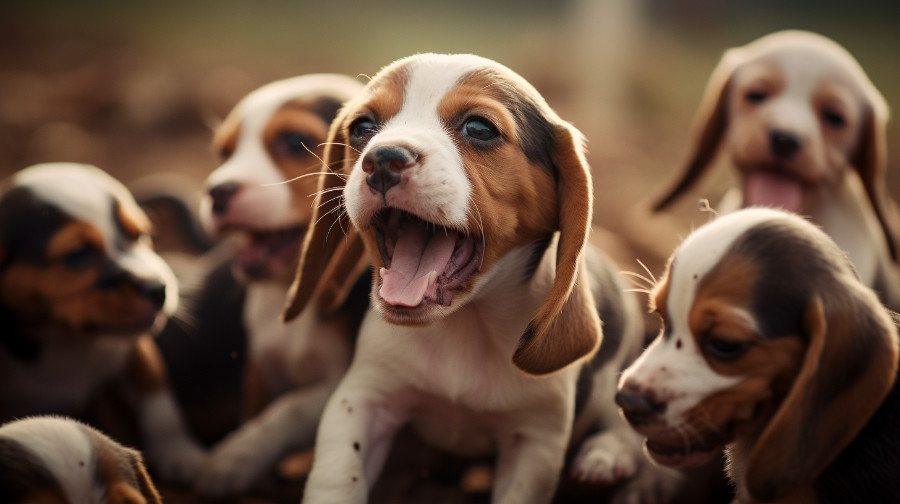Physical Address
304 North Cardinal St.
Dorchester Center, MA 02124


When your puppy is teething, he or she may bite their fingers or other things around the house to ease his or her discomfort. If this is happening in your household, providing appropriate and safe teething toys could be useful in stopping the biting behavior.
Puppies learn quickly that when they bite too hard with their litter mates, the other dog will release an uncomfortable noise followed by a loud yelp and then back off from playing – showing that biting is not fun and will not result in additional attention from others.
Beagle puppies usually bite their gums for relief when temporary teeth (known as milk teeth) first begin emerging between 2-4 weeks of age, as temporary or milk teeth begin to come in. This stage typically lasts 1-4 weeks.
At this stage, you may notice small blood spots on your puppy’s carpet or toys and they may drool excessively – this helps lubricate their gums so they won’t feel itchy or sharp.
Once teething is completed, your puppy should have all 42 permanent adult teeth – meaning they likely won’t bite you anymore and instead prefer chew toys over sneaker or furniture chewing!
Beagle chew toys or deer antlers can help promote proper teething in beagle pups by providing natural, healthy alternatives to footwear! Not only are these durable toys super affordable online but they’re super durable too, providing long-term relief to gums! Just remember to supervise when they attempt to chew something dangerous; remember, they’re still learning how to play safely!
As puppies explore their new world, they’re bound to come into contact with other dogs that will bite. While these might appear like playful interactions, if any are painful then the other dog may let out an audible yelp and bites will stop immediately.
Beagle puppies will experience many unfamiliar stimuli upon entering their new home; from people, pets and other dogs in their family all establishing dominance relationships to living alone for the first time.
Beagles enjoy chewing to stay entertained, which means they may chew on shoes, table legs and other non-approved objects that you find off limits. While this behavior cannot always be prevented completely, toys or cold treats that are harmless might help redirect them away from whatever they were previously chewing on – helping teach them that this behavior is unacceptable and should be changed quickly rather than quickly rushing it. Beagles can be very stubborn creatures! It is best to train slowly with patience so as not to overwhelm their learning process later.

As puppies play together, they may bite to mark their territory and determine if another dog is playing too roughly. While biting during playful interactions is completely acceptable, you should discourage this behavior to prevent it from turning into aggressive biting.
When your beagle begins mouthing you during play, take swift action by redirecting their attention with something fun such as a toy. This will teach them that biting during play is unacceptable and help prevent them from chewing on you when bored or teething.
Redirection can also be an effective solution when your beagle starts barking at other dogs during walks. By teaching your pup that barking at other dogs is inappropriate and prevent them from becoming aggressive when encountering other canines later, redirection should help stop future aggressive incidents from erupting into aggression towards other canines. Obedience training or using stern “Nos” and correction strategies such as redirection can also help correct such behavior; just make sure it addresses its source first!
Beagles are task oriented dogs, and biting during play is one way they focus their attention. Although these bites may feel playful or harmless, allowing them to continue could quickly escalate to more serious forms of bites that may require medical intervention.
Repellent tactics such as rewarding them with additional play can actually increase their behavior, so use quick retreat from the situation and verbal correction such as “yelp or ow” to let them know their bite is too hard. Redirect their focus onto a chew toy to allow them to relax from overstimulation.
Beagle puppies can also be effectively stopped from biting through social withdrawal and crate time. When their behavior begins to bite during play, remove them from the activity by walking away or giving them somewhere safe to retreat and relax (such as their crate). This enables them to understand that their behavior does not result in any tangible rewards and will eventually stop on its own; otherwise obedience training and an explicit “No” command might be required.
Beagle puppies should never be allowed to bite too hard while playing, even though this behavior might appear adorable at the time. But, you must stop it as soon as possible or it could worsen and have serious repercussions for all parties involved.
Play bites in puppies are completely normal, but it’s essential that they learn not to do it on people. A great way of doing this is redirecting their attention onto something else such as a chew toy or treat, teaching them that any time they bite too hard it will stop being fun!
Puppies typically learn their bite inhibition from litter mates and mothers during play interactions, but you can help train your pup not to bite by using a sharp “yelp” when a dog bites too hard and then withdrawing from interaction; this will teach him/her that too rough play won’t get them any attention, creating an effective yet simple solution.